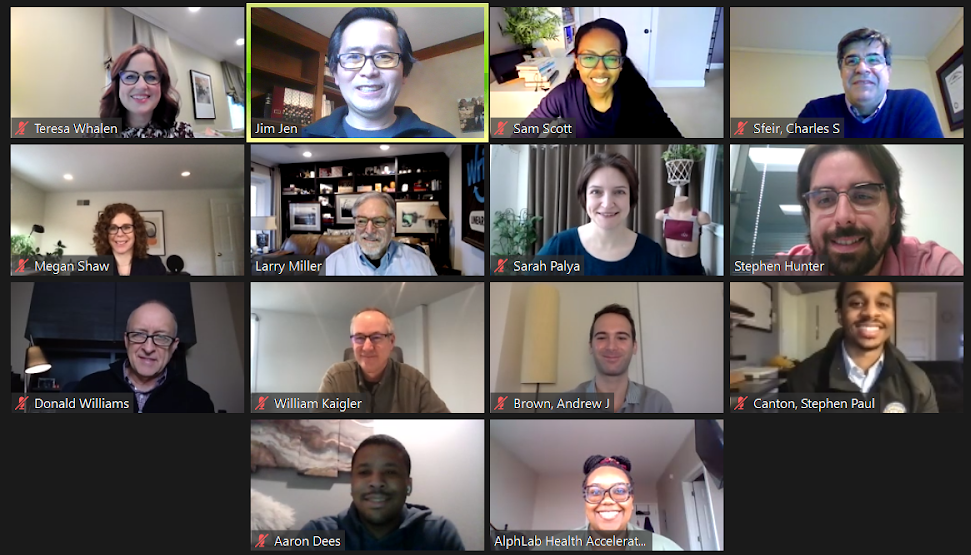Megan Shaw loves the excitement of the startup world.
That enthusiasm would lead down a path toward boosting life science companies — and Pittsburgh.
After advising companies as a consultant early in her career, “I decided that I really wanted to do a startup and really be in that role where I could be part of building something,” she told Technical.ly.
Shaw soon found a chance to dive head first into that world with HemoSonics, a Virginia-based point-of-care diagnostics firm focused on blood transfusion applications. There, she used her consulting background and economics education to advise on the business side of the startup, leading it to a successful exit through an acquisition by Stago Group in 2017.
After that, Shaw returned to work as a consultant, keeping up her interest in the life sciences through work such as National Institute of Health’s RADx program for rapid development and deployment of COVID-19 diagnostics.
Meanwhile, Pittsburgh startup resource hub Innovation Works was cooking up a plan to launch a third iteration of its accelerator program, this time centering on companies in the life sciences. Shaw got a call about a new position to lead it — a role that she took first as the portfolio executive of life sciences in January of this year, and later as the managing director of life sciences starting in June 2021.
Within the industry, one field Shaw has seen come to the forefront is the use of artificial intelligence in life sciences applications.
“I think historically, about about a third of Innovation Works companies [in its other accelerators] have been in life sciences, so they have a pretty strong track record,” Shaw said of why the organization launched its life sciences-focused accelerator AlphaLab Health. The program is an initiative of both Innovation Works and Allegheny Health Network, a nonprofit hospital system in the Pittsburgh area. So far, the program has gone through just one cohort of startups. The application window for a second one closed earlier this fall, and Shaw said an announcement of the new participants is imminent.
Though Shaw’s primary role is to advise the life sciences companies involved with Innovation Works (either through AlphaLab Health or as a portfolio company of the organization’s investing arm), but her day to day can vary widely.
“A lot of my time is really building [AlphaLab Health],” she said. “So defining what we want the programmatic content to be, who the right mentors are, running the process to identify the right companies and really being very thoughtful about what we do that’s different, and who can benefit from that.”
Much of the work behind all of that comes down to two areas that Shaw said she’s learned to focus on even more after completing the first cohort of startups this summer.
Because part of Innovation Works’ purpose is to serve as a resource connector for companies, Shaw now puts more emphasis on bringing in medical professionals and others in clinical operations to advise earlier in the accelerator process. This, she said, helps startups be more aware of the exact customer needs they’ll have to fulfill, and how a product can fit into an existing workflow.
Another challenge she wants to make easier for AlphaLab Health startups is understanding the financials of life sciences, and how the purchasing and reimbursement processes actually work. That’s something she wishes she herself understood better in her early days with HemoSonics.
“Literally one of the first presentations that we now do [for AlphaLab Health] is kind of like, ‘Here’s an overview of insurer and hospital economics and here’s the basics,’ and then we do one that goes deeper,” she said.

The inaugural AlphaLab Health cohort gathered on Zoom for a showcase in June 2021. (Courtesy image)
The AlphaLab Health cohorts are small. Out of 79 applicants for the first cohort, only seven companies presented at the inaugural showcase in June. While the size of the second cohort hasn’t been announced yet, Shaw shared that there were about 125 applicants this time around.
But that doesn’t necessarily mean those who aren’t accepted into the program have bad business ideas, she emphasized.
“I think we’re really trying to help companies that do have a proof of concept and do have a business model outlined, and we’re really trying to test that and take it to that next level” Shaw said. “And so there are many earlier companies that are great companies, and so it’s not at all a reflection on them.”
She wants to make that point clear, she said, largely because she sees a great deal of potential in the applicants to AlphaLab Health in the broader life sciences scene in Pittsburgh. Mentioning two recent public offerings from the local industry — an IPO from Cognition Therapeutics and one via acquisition for Cernostics — she sees a lot of potential for more companies to grow here.
“Those are seeds that were planted a long time ago, and we’re seeing them bear fruit now,” she said.
Beyond advising companies, Shaw’s connections to mentors, end users, customers and more resources give her good insight to Pittsburgh’s potential as a life sciences hub. Though she acknowledges there are a wide variety of companies growing here in gene therapy, medical devices, pharmaceuticals and more, one field she’s seen come to the forefront a bit more is the use of artificial intelligence in life sciences applications.
Shaw’s not sure if that specialty will make Pittsburgh a global capital for AI in healthcare, or if the city even needs that to become a solid life sciences hub. But she sees a pathway there that others have struggled to define.
“I think that is an area that we are really well positioned between the combination of having these two preeminent integrated delivery and finance systems that can make can really be used this testbeds,” she said, referring to organizations like UPMC, Highmark and more healthcare systems with strong Pittsburgh presences. “And with the incredible AI resources — here marrying those two, I think is an area that we can really lead.”
Sophie Burkholder is a 2021-2022 corps member for Report for America, an initiative of The Groundtruth Project that pairs young journalists with local newsrooms. This position is supported by the Heinz Endowments.
This editorial article is a part of Tech + Health Month of Technical.ly's editorial calendar. This month’s theme is underwritten by the Chesapeake Digital Health Exchange. This story was independently reported and not reviewed by CDHX before publication.
Join our growing Slack community
Join 5,000 tech professionals and entrepreneurs in our community Slack today!
Donate to the Journalism Fund
Your support powers our independent journalism. Unlike most business-media outlets, we don’t have a paywall. Instead, we count on your personal and organizational contributions.

Startups often struggle with grant applications. A new group wants to change that.

This Week in Jobs: It’s gonna be May (and one of these 24 open roles is gonna be your next job)

As AI reshapes work, some Pittsburgh jobs vanish while others surge


